|
|
|
Sort Order |
|
|
|
Items / Page
|
|
|
|
|
|
|
| Srl | Item |
| 1 |
ID:
156901


|
|
|
|
|
| Summary/Abstract |
Anticipating whether an adversary group will continue to use their usual (“conventional”), expected attack methods is important for military and counterterrorism practitioners tasked with protecting the security of others. Conventional attack methods are by their nature easier to plan and prepare for whilst “innovative” methods may take those responsible for security and counterterrorism by surprise and, as such, may have more impact and more serious consequences. The present study aimed to develop understanding of how, when, and why adversary groups might decide to use conventional attack methods or opt to do something innovative instead. A literature review was conducted and findings were applied to develop a thorough understanding of the decision-making process that underlies an adversary group's choice of attack method. Identified are three stages preceding the execution of an attack: a) “strategic direction”; b) “incubation”; and c) “planning and preparation,” plus “overarching” and “contextual” factors that can influence the process at each stage. It is suggested that it is these factors and how they influence decision-making that result in innovative methods being used to execute an attack, or convention prevailing. Findings can aid practitioners and policy-makers in counterterrorism, security, and law enforcement, to support their understanding, evaluation, and countering of current and future threats.
|
|
|
|
|
|
|
|
|
|
|
|
|
|
|
|
| 2 |
ID:
156914


|
|
|
|
|
| Summary/Abstract |
This article investigates Twitter data related to the kidnapping case of two German nationals in the southern region of the Philippines by the Abu Sayyaf Group (ASG). It explores perceptions of the ASG, along with associated organizations and sentiments indicated in the tweets together with statistically significant relationships. Findings revealed that: “Rebel” and “Militant” were the most frequently used labels for the ASG; a majority of the tweets contained sentiments that assess threats such as abduction and kidnapping of hostages; and almost half contained words that indicate negotiation or concession to the demands of the captors. Logistic regression analyses on “Rebel” and “Islamist” revealed positive coefficients for these sentiments used as predictors. This meant that people who assessed threats and expressed sentiments that responders should concede to the captors’ demands were more likely to use the “Rebel” or “Islamist” labels. Rather than the two longstanding dominant narratives of the ASG as terrorists and criminals, the emerging rebel and militant labels suggest a more domestically and politically sensitive Twitter commentary than is represented in the work of the Al-Qaeda-centric paradigm exponents. These findings, along with the complex associated political and policy contexts and implications, are discussed in this article.
|
|
|
|
|
|
|
|
|
|
|
|
|
|
|
|
| 3 |
ID:
156917
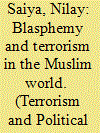

|
|
|
|
|
| Summary/Abstract |
This article examines the effect of blasphemy laws on Islamist terrorism in Muslim-majority countries. Although passed with the ostensibly noble purpose of defending religion, I argue that blasphemy laws encourage terrorism by creating a culture of vigilantism in which terrorists, claiming to be the defenders of Islam, attack those they believe are guilty of heresy. This study empirically tests this proposition, along with alternative hypotheses, using a time-series, cross-national negative binomial analysis of 51 Muslim-majority states from 1991–2013. It finds that states that enforce blasphemy laws are indeed statistically more likely to experience Islamist terrorist attacks than countries where such laws do not exist. The statistical analysis is supplemented with a brief case study of blasphemy laws and terrorism in Pakistan. The conclusion situates the findings in the context of policy.
|
|
|
|
|
|
|
|
|
|
|
|
|
|
|
|
| 4 |
ID:
156897
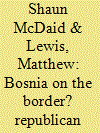

|
|
|
|
|
| Summary/Abstract |
Unionist politicians have argued that Republican political violence on the Irish border, during both the partition of Ireland and more recent Northern Ireland conflict, constituted ethnic cleansing and genocide against the Protestant/Unionist community in those areas. These views have been bolstered by an increasingly ambivalent scholarly literature that has failed to adequately question the accuracy of these claims. This article interrogates the ethnic cleansing/genocide narrative by analysing Republican violence during the 1920s and the 1970s. Drawing from a wide range of theoretical literature and archival sources, it demonstrates that Republican violence fell far short of either ethnic cleansing or genocide, (in part) as a result of the perpetrators’ self-imposed ideological constraints. It also defines a new interpretive concept for the study of violence: functional sectarianism. This concept is designed to move scholarly discussion of political and sectarian violence beyond the highly politicised and moral cul-de-sacs that have heretofore characterised the debate, and has implications for our understanding of political violence beyond Ireland.
|
|
|
|
|
|
|
|
|
|
|
|
|
|
|
|
| 5 |
ID:
156911
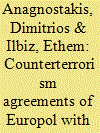

|
|
|
|
|
| Summary/Abstract |
This article investigates empirically the impact of power asymmetry and interest formation in the European Union’s (EU) external relations with third countries in the context of the Europol data exchange and counterterrorism agreements. It focuses on three countries, namely the United States, Turkey, and Morocco, which each have a different level of counterterrorism cooperation with the EU. This article argues that the EU acts as a pragmatic actor with regard to Europol’s data exchange agreements with third countries, and that the power asymmetry between the EU and the third country under question determines the extent of the EU’s flexibility. If the power asymmetry favours the EU, then it insists on its data protection demands. Otherwise, the EU is more flexible towards its counterparts on data protection issues.
|
|
|
|
|
|
|
|
|
|
|
|
|
|
|
|
| 6 |
ID:
156906


|
|
|
|
|
| Summary/Abstract |
This research used open source information to investigate the motivational backgrounds of 219 suicide attackers from various regions of the world. We inquired as to whether the attackers exhibited evidence for significance quest as a motive for their actions, and whether the eradication of significance loss and/or the aspiration for significance gain systematically differed according to attackers’ demographics. It was found that the specific nature of the significance quest motive varied in accordance with attackers’ gender, age, and education. Whereas Arab-Palestinians, males, younger attackers, and more educated attackers seem to have been motivated primarily by the possibility of significance gain, women, older attackers, those with little education, and those hailing from other regions seem to have been motivated primarily by the eradication of significance loss. Analyses also suggested that the stronger an attacker’s significance quest motive, the greater the effectiveness of their attack, as measured by the number of casualties. Methodological limitations of the present study were discussed, and the possible directions for further research were indicated.
|
|
|
|
|
|
|
|
|
|
|
|
|
|
|
|
| 7 |
ID:
156919
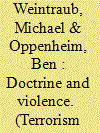

|
|
|
|
|
| Summary/Abstract |
Military theorists and practitioners have long argued that training shapes how combatants treat civilians during war. Yet there is little systematic evidence regarding the impact of training on wartime behavior, and almost none for non-state armed groups, despite the fact that such groups intensively train their fighters in order to shape their behavior towards civilian populations. This article argues that among insurgent groups that emphasize the strategic and tactical importance of restraint towards civilian populations, political training can reduce civilian killings. We test the observable implications of our theory in the case of Colombia, using survey data on former Revolutionary Armed Forces of Colombia (FARC) insurgents and sub-national data on civilian killings. We find support for our hypothesis, with results that are robust to a range of model specifications and controls, including alternate sources of combatant discipline and obedience, such as military training and punishment.
|
|
|
|
|
|
|
|
|
|
|
|
|
|
|
|
| 8 |
ID:
156909
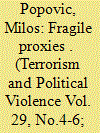

|
|
|
|
|
| Summary/Abstract |
Foreign governments frequently intervene in armed conflicts by sponsoring rebels against their adversaries. A sponsorship is less costly than a direct military intervention, but rebels often defy orders, desert fighting, or turn guns against their sponsors. Under what conditions do rebels defect against their sponsors? Drawing on organizational theory, I argue that as rebel organizations become less centralized and formalized, the rebels are likely to defect against their sponsors. This occurs because non-centralized organizations have weak central leadership and allow for dispersed decision-making, both of which narrow the manipulative capacity of sponsors. Due to these disadvantages, non-centralized rebel movements are less accountable to their sponsors, cannot credibly commit to rapidly change their policies in response to changes in the sponsor’s demands, and suffer from frequent and destructive quarrels between the top and lower echelons. Using multilevel logistic models for panel data, I test my argument on a novel dataset. My quantitative analysis shows that rebel structure is a robust predictor of defection.
|
|
|
|
|
|
|
|
|
|
|
|
|
|
|
|
| 9 |
ID:
156903
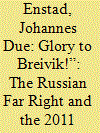

|
|
|
|
|
| Summary/Abstract |
This article documents Anders Behring Breivik's reception on the Russian far Right, with a comparative view to Western Europe. On July 22, 2011, Breivik carried out two terrorist attacks in Norway, killing 77 people. Based on a variety of open sources, the article finds that Breivik has received much more open support in Russia than in Western Europe. I suggest there are three main reasons why Russia stands out. First, a weaker social stigma attached to Right-Wing extremism reduces the cost of publicly embracing Right-Wing terrorists. Second, higher levels of violence in Russian society increase desensitization and violence acceptance. Third, the embrace of Breivik fits into a vibrant tradition of iconizing Right-Wing militants on the Russian far Right. The article highlights Russia as a hotspot of Right-Wing extremist activism in Europe. It also provides insights that may prove useful in future comparative research on cross-national variation in Right-Wing violence and terrorism.
|
|
|
|
|
|
|
|
|
|
|
|
|
|
|
|
| 10 |
ID:
156900


|
|
|
|
|
| Summary/Abstract |
In a context where widespread failings in the nature of terrorism research are well recognised—yet where the quantity of work is still enormous—is it possible to fairly assess whether the field is progressing or if it has become mired in mediocre research? Citation analysis is widely used to reveal the evolution and extent of progress in fields of study and to provide valuable insight into major trends and achievements. This study identifies and analyses the current 100 most cited journal articles in terrorism studies. A search was performed using Google Scholar for peer-reviewed journal articles on subjects related to terrorism and counter-terrorism. The most cited articles were published across sixty-two journals, which reflected the interdisciplinary nature of terrorism studies. Compared to other articles, the most cited articles were more likely to be the result of collaborative research and were also more likely to provide new data. Sixty-three of the top 100 articles have been published since 2001. The findings are discussed in relation to the evolution of terrorism research and current debates on progress in the field.
|
|
|
|
|
|
|
|
|
|
|
|
|
|
|
|
| 11 |
ID:
156908
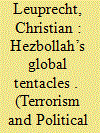

|
|
|
|
|
| Summary/Abstract |
That terrorists, criminals, and their facilitators exploit the global marketplace is well known. While the global movement of illicit goods is well documented, robust empirical evidence linking terrorism and organized crime remains elusive. This article posits Network Science as a means of making these links more apparent. As a critical case study, Hezbollah is quite possibly the most mature globalized terrorist organization, although it thinks of itself as the “Party of God.” However, the means seem to justify the ends: this article shows that Hezbollah’s holy men have no qualms about resorting to pornography, contraband cigarettes, immigration fraud, and credit card fraud to raise funds. Beyond establishing links, Social Network Analysis reveals other important characteristics, such as the relative autonomy from Hezbollah headquarters that local fundraising networks enjoy. That finding implies a paradigm shift: Hezbollah is no less a terrorist organization than an organized crime syndicate. This is apparent in a network’s structure. Transnational Organized Crime is typically about nodes being connected to many others in the network. Yet, Hezbollah fundraising networks allow such connectivity because of the group’s typically high levels of mutual trust and familial relationships. This creates a vulnerability that can be exploited by law enforcement and intelligence organizations.
|
|
|
|
|
|
|
|
|
|
|
|
|
|
|
|
| 12 |
ID:
156898
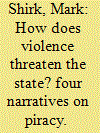

|
|
|
|
|
| Summary/Abstract |
Violence characterized by similar actions, actor motivations, group structures, or level of damage still poses qualitatively distinct genera of threats to states. For instance, “terrorism” can threaten a particular state, be used by a state, or threaten the entire state system. Building on the threat construction literature, this study argues that threat is best understood through narratives on the relationship between violence and the boundary-producing practices that construct the state. Four ideal-typical basic narratives on this relationship are produced—entrant, resource, revisionist, and criminal. Each narrative is then demonstrated by looking at how it was used in a historical case of piracy. The action (piracy as raiding at sea) is held constant while the threat in each varies with the narrative. Understanding how threat is narratively constructed can help us to understand particular historical episodes of violence and state responses to them.
|
|
|
|
|
|
|
|
|
|
|
|
|
|
|
|
| 13 |
ID:
156904
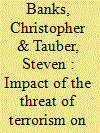

|
|
|
|
|
| Summary/Abstract |
Federal courts are key actors in the U.S. government’s fight against terrorism because they adjudicate cases based on the USA PATRIOT Act, and accordingly make national security policy. We examine the extent that the terror threat influences judicial decisions in a dataset of 111 USA PATRIOT Act cases decided in the U.S. District Courts from 2001 through 2013, while controlling for other judicial decision-making variables. The results demonstrate that when a case involves a heightened terror threat, federal judges are more likely to defer to the government. Some key control variables are also significant.
|
|
|
|
|
|
|
|
|
|
|
|
|
|
|
|
| 14 |
ID:
156905


|
|
|
|
|
| Summary/Abstract |
Targeted killings have become a central component of counterterrorism strategy. In response to the unprecedented prevalence of this strategy around the world, numerous empirical studies have recently examined whether “decapitating” militant groups with targeted killings is strategically effective. This study builds on that research program by examining the impact of targeted killings on militant group tactical decision-making. Our empirical strategy exploits variation in the attack patterns of militant groups conditional on whether a government’s targeted killing attempt succeeded against them operationally. In both the Afghanistan-Pakistan and Israel-West Bank-Gaza Strip theaters, targeted killings significantly alter the nature of militant group violence. When their leaderships are degraded with a successful strike, militant groups become far less discriminate in their target selection by redirecting their violence from military to civilian targets. We then analyze several potential causal mechanisms to account for these results and find strongest evidence that targeted killings tend to promote indiscriminate organizational violence by empowering lower level members with weaker civilian restraint.
|
|
|
|
|
|
|
|
|
|
|
|
|
|
|
|
| 15 |
ID:
156907


|
|
|
|
|
| Summary/Abstract |
This article focuses on the so-called “brutalization” of terrorism. The brutalization thesis as part of the larger theoretical concept of “new terrorism” argues that “new terrorism” is more brutal than “old terrorism.” Many scholars claim that the 9/11 attacks mark the beginning of a new era of terrorism that has lifted international as well as domestic terrorism to a new level of violent brutality. Others argue that this process had already started in the early 1990s. After discussing possible ways to operationalize a brutalization of terrorism, for example focusing on suicide bombings or terrorist attacks against soft targets, this article tests the empirical credibility of the brutalization thesis regarding both potential starting points. Data from the Global Terrorism Database (GTD) shows that only three out of nine indicators increased significantly during the 1990s, partially backing the idea of a general brutalization, whereas increasing numbers of suicide attacks and beheadings after 9/11 support the notion of a qualitative change in terrorism and its brutality connected with the idea of maximizing media and public attention. Yet, these developments are regionally limited and the brutality of this “new terrorism” exceeds the levels known from the zenith of “old terrorism” in the 1970s and 1980s in only a few cases.
|
|
|
|
|
|
|
|
|
|
|
|
|
|
|
|
| 16 |
ID:
156894


|
|
|
|
|
| Summary/Abstract |
This article posits that the remnants of archaic sociocultural norms, particularly the honour-imposed custom of retaliation, play a crucial role in the process of insurgent engagement in Russia's autonomous republic of Dagestan. Through a series of interviews with former insurgents, this study outlines two retaliation-centred mechanisms: “individual retaliation” and “spiritual retaliation” in order to explain the microcosm of motives behind insurgent activity in Dagestan. In doing so, this study problematizes the role of Salafi/Jihadist ideology as the main impetus for insurgent violence. Reversing the traditional causal link between violence and religion, this study also demonstrates that the development of Jihadist ideology is a by-product of insurgent mobilization rather than its cause.
|
|
|
|
|
|
|
|
|
|
|
|
|
|
|
|
| 17 |
ID:
156893


|
|
|
| 18 |
ID:
156902


|
|
|
|
|
| Summary/Abstract |
An unprecedented expansion of global anti-terrorist policing took place after 1900, although the security forces projected outside their borders by Russia, Italy, Germany, Austria-Hungary, Spain, and Argentina displayed an enormous diversity in size and effectiveness. Crucial to successful policing was how these countries improved their intelligence through recruiting and handling informers, maintained secrecy and good relations with local police, and handled the media. The British approach to anarchist control was arguably the most successful. Italian international policing was the most far-reaching, while the United States long remained the world's most under-policed large country. On examination, the view that anti-anarchist policing was a case of conservative imperial regimes versus the Western democracies loses validity. During this period, a general trend saw the transfer of anarchist surveillance from the hands of diplomats into those of interior ministry officials and the police, all in the name of greater centralization, professionalization, and efficiency.
|
|
|
|
|
|
|
|
|
|
|
|
|
|
|
|
| 19 |
ID:
156899


|
|
|
|
|
| Summary/Abstract |
Germany might be considered as the European country that has suffered the most from the spatial diffusion of Turkey's internal conflicts. It has received the highest number of Kurdish migrants in Europe and it became the core of Kurdish mobilization in transnational space. Germany's approach to the Kurdish Question on its own soil—combined with the strategies that the Kurdish activists used—determined the scope of opportunity structures for the mobilization of the Kurdish movement. This article explains how Kurdish activism has come to be perceived in Germany, and analyzes the German political environment by focusing on the criminalization and stigmatization of the Kurdish movement, especially during the 1990s. It then describes the discursive shift and change in framing strategies that the Kurdish diaspora experienced after the capture of the the Kurdistan Workers' Party's (PKK) leader in 1999. Lastly, it touches upon the recent developments in the Middle East, especially in Kobane, and their impact on the image of the Kurdish movement. The article is based on extensive fieldwork in Germany and includes testimonies of Kurdish diaspora activists, with a focus on their own perceptions about their situation and how they respond to securitization policies in the host country.
|
|
|
|
|
|
|
|
|
|
|
|
|
|
|
|
| 20 |
ID:
156896


|
|
|
|
|
| Summary/Abstract |
This research investigates the dramatic expansion of the Boko Haram insurgency in Nigeria in the last few years. Militant activity has expanded in terms of frequency and severity of attacks, geographic scope, target selection, and strategies used. The evolution of the group and the trajectory of violence are best explained through four overlapping theoretical strands. These include the growing fragmentation of the movement, development of strategic ties with Al Qaeda affiliates, strong-armed counterterrorism operations that further radicalized the movement, and exploitation of the porous border area that separates Nigeria from its northern neighbors.
|
|
|
|
|
|
|
|
|
|
|
|
|
|
|
|
|
|
|
|
|